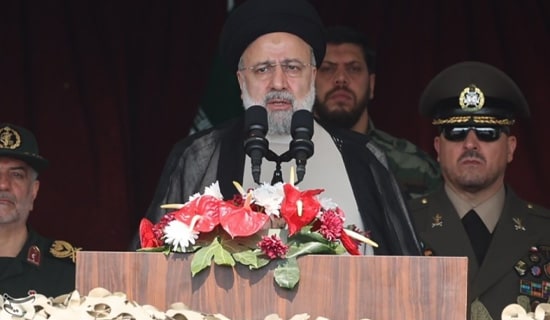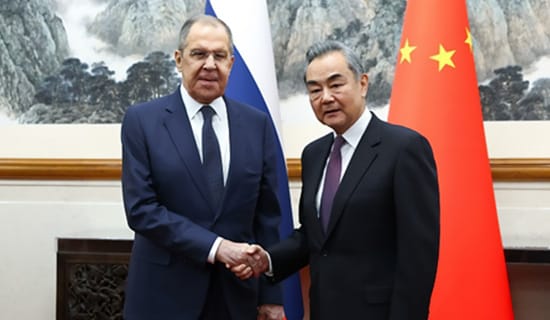Introduction
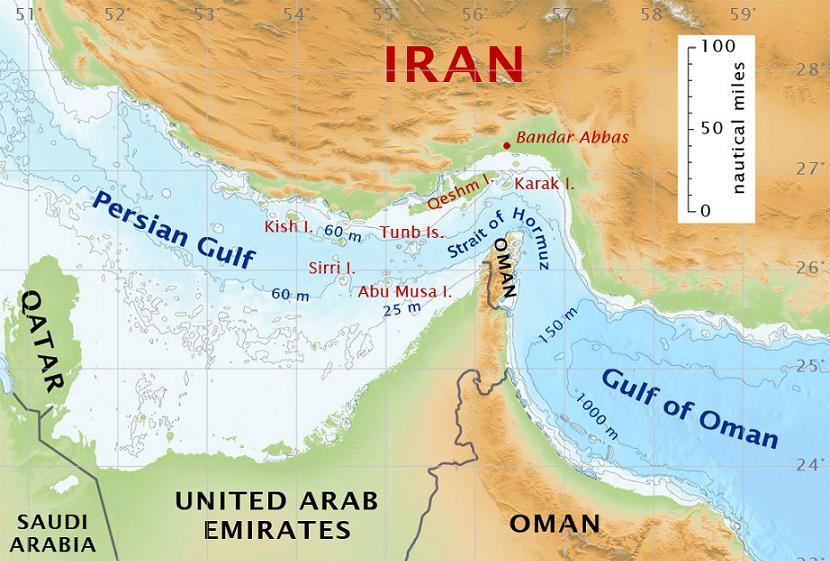
Only 21 nautical miles (39km) wide at its narrowest point, the Strait of Hormuz, situated between Iran and the UAE, has enormous strategic importance. Each day, approximately 15-20 tankers pass through it, together transporting approximately 17 million barrels of oil, constituting some 20% of the world's daily oil supply.[1] In addition to crude, 84 million tons of liquefied natural gas (LNG) and 2 million barrels of petroleum products are carried through the strait annually. Currently, oil exports from Bahrain, Qatar, the UAE, and Iran pass through the Strait, as does the bulk of Saudi and Iraqi oil.[2]
Iran's Change Of Rhetoric
For years, Iran has been issuing aggressive statements expressing its intention to close the Strait of Hormuz in retaliation for the U.S. and European sanctions. Notably, the National Security and Foreign Policy Committee of the Iranian Majlis drafted a bill banning oil tankers from shipping crude through the Strait of Hormuz to countries that support sanctions on Iranian oil.[3] A senior commander in Iran's Islamic Revolutionary Guard Corps (IRGC), Rear Admiral Ali Fadavi, took an even fiercer stance, announcing that missiles with a range exceeding 220km (137.5 miles) were being installed on Iranian vessels, which he described as "not the world's regular and conventional vessels, but very small ones with high speed and great maneuvering and firing capabilities." He added: "At present, conditions are such that we choose the court and set the rules of the game, because we are not impinging on the U.S. and they have come to our vicinity in... the Persian Gulf."[4]
More recently, however, Iran suddenly toned down its threats to close the strait. Calling it one of the world's most important energy routes, Iranian Chief of Staff Major-General Hassan Firouzabadisaid said that Iran would not close this key route unless the country's interest were at risk.[5] Iranian Foreign Minister Ali Akbar Salehi went further in downplaying the threat by relegating it to the realm of the hypothetical. On a surprise visit to the UAE, he said: "Those who suggested this idea probably have in mind that, if Iran is denied access to the Persian Gulf for whatever reason… it will probably react appropriately... but I don’t think such a time will ever come."[6]
Iran's change of tone was presumably motivated by both strategic and tactical considerations, as follows:
(a) The Gulf countries' construction and renovation of pipelines bypassing the strait.
(b) Fear of harming itself by cutting off its own oil exports.
(c) Fear of alienating the Iraqi Shi'ites, who stand to lose from the closure of the strait, as well as China, which supports Iran in the UN Security Council.
(d) Concern about providing the U.S. with a casus belli.
Construction/Rehabilitation Of Pipelines To Bypass Strait Of Hormuz
As a precautionary measure against the closure of the Strait, the UAE has recently completed the construction of the Habshan-Fujairah crude oil pipeline, which will enable the country to export a large portion of its oil without passing through the Strait of Hormuz. 48 inches in diameter and 350 kilometers (194 miles) in length, the pipeline, which was built by a Chinese company at a cost of $2.7 billion, will deliver 1.5 million barrels per day (mbd) to the loading terminal at the port of Fujairah in the eastern part of the UAE. The capacity of the pipeline can be increased to 1.8 mbd at a later date, in order to accommodate man even larger portion of the UAE's oil production, which currently stands at 2.4 mbd.[7] With a touch of schadenfreude, the UAE daily Gulf News ran an editorial that read: "...The Iranian threats have backfired. They have not only allowed the UAE to bypass the strait with nearly two thirds of its [oil] exports, but have also spurred other countries to investigate ways and means of reducing the threat."[8]
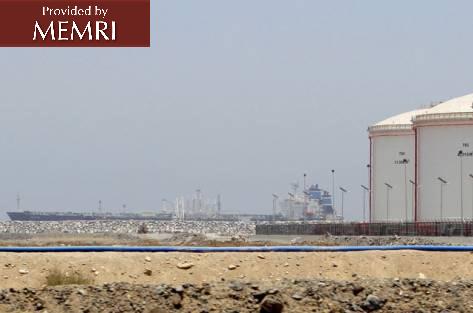
Fujairah port, UAE[9]
One of these countries is Saudi Arabia. The kingdom is currently rehabilitating the Iraqi Pipeline in Saudi Arabia (IPSA), which it confiscated in 2001 as compensation for debts owed by the Iraqi government. Built by Iraq during its war with Iran as a way to bypass the Strait of Hormuz, it traverses Saudi Arabia from east to west, and was designed to carry 1.65mbd of oil from Basra to ports on the Red Sea. It was used for only one year after its construction, and was shut down following Iraq's 1990 invasion of Kuwait.
The Saudi government began rehabilitating the IPSA five months ago. A Saudi official said: "Saudi Arabia is now in control of the pipeline [and its associated] pumping stations, storage units, communications equipment and other facilities." He added pointedly: "Now that we own [the pipeline], we can do whatever we want with it, to benefit the Saudi economy... It is a pipeline in search of a job."[10] Saudi oil expert Dr. Rashid Aba'imi points out that it would be possible to double the pipeline's capacity of 1.65 mbd by injecting certain chemical compounds to expedite the flow of oil.
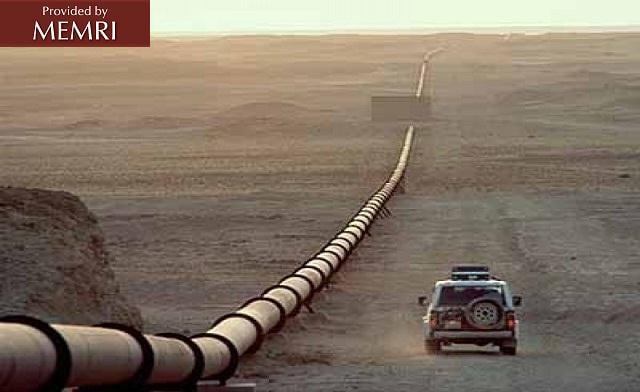
Iraqi Pipeline in Saudi Arabia (IPSA)[11]
Saudi Arabia has also considered rehabilitating the Trans-Arabia Pipeline, known as the Tapline, which until 1967 carried Saudi oil to the Lebanese port of Saida[12] and was shut down with the outbreak of the Six Dar War, when Israel occupied the Golan Heights, through which it passes.
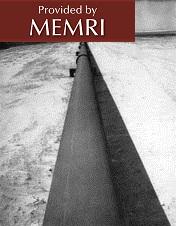
Trans-Arabia Pipeline (Tapline)[13]
SUPPORT OUR WORK

Iraq, on the other hand, is now almost entirely dependent on shipping its increasing volume of crude through the Strait of Hormuz, with the exception of a small quantity that is exported via Kirkuk to the Turkish port of Cihan. However, plans are underway to restore the Turkish route to its original volume of 1.6 mbd, and possibly to construct a new north-south pipeline to transport oil directly to Cihan. Kuwait, another major oil exporter, and Qatar, the largest exporter of liquefied natural gas, currently have no way of bypassing the strait. Both countries, however, have large reserves of cash and considerable foreign investments that would enable them to weather a difficult period arising from a possible closure of the strait with no appreciable decline in their standard of living.
Avoiding Self-Inflicted Harm
Iran's oil exports have been dwindling in the face of sanctions. While no precise data are available, considering that Iran may be selling oil at spot markets for cash at a considerable discount, recent estimates suggest that Iran is now exporting about 1.4-1.6 mbd – at least 1 mbd less than just a year ago, though oil export is still a major source of its foreign currency revenues. Unlike the Arab oil-producers, who have hefty sovereign wealth funds to cushion their national economies in times of economic crisis, Iran could face political destabilization in the event of a sharp decline in oil revenues.
Iran's economic woes are enormous. The national currency has declined by 50% against the dollar, inflation stands at over 30%, and unemployment, particularly among ages 16-24, may be as high as 40%. Closing the Strait of Hormuz would stem off the foreign currency Iran needs to import food and staple goods. Closing the Strait would exacerbate the country's economic woes, and could exacerbate public discontent to a level threatening the regime's very survival.
Speaking on the BBC, Saudi commentator Dr. 'Abdallah Al-Nufaisi said Iran was insincere in its threats to close the strait, since it needs the strait more than any other country in the Gulf.[14] Moreover, Iran is obliged to listen to its allies.
China, a key partner and still a major importer of Iranian crude, has urged Iran not to close the strait.[15] While on an official visit to Qatar early this year, Chinese Prime Minister Wen Jibao said Beijing was opposed to any "extreme action" on the part of Iran to shut the strait.[16]
Alienating The Iraqi Shi'ites
Most analysts agree that Iran has emerged as the primary beneficiary of the U.S. invasion of Iraq. Tehran's influence is currently felt across the spectrum of Iraq's political, economic, military, intelligence, diplomatic, social, and cultural life. Prime Minister Nouri Al-Maliki owes his position to Iran, which, in 2005, exercised considerable pressure on the various Shi'ite groups in Iraq, particularly on the Sadrists, to support Al-Maliki for a second term as prime minister. Iran’s trade with Iraq exceeds $10 billion annually, and most of it is unilateral: Iraqi markets are flooded with Iranian goods.
Iraq's oil exports exceed 2.4 mbd, most of them exported from the south if the country through the Strait of Hormuz to international markets. Iraq's oil reserves are concentrated primarily in the south, which is predominantly Shi'ite. Considering that oil revenues represent 90% of government revenues, closing the strait would deliver a devastating blow to the Iraqi people and economy. Most significantly, it would alienate Iraq's Shi'ites, whose support Iran needs in order to maintain its influence in Iraq. It would also harm Iranian exporters, who need the Iraqi market for their manufactured goods and agricultural products.
In an interview with the Iraqi government daily Al-Sabah, 'Ali Al-Dabbagh, a government spokesman, said that Iraq has urged Iran to resolve its problems with the international community peacefully. He stressed that Iran “has no right to close the Strait of Hormuz, because Iraq will absorb most of the damage resulting from such an act.”[17]
Providing The U.S. With A Casus Belli
The U.S. administration has gone on record saying that it is committed to keeping the Strait of Hormuz open. It has repeatedly warned that closing the strait is a “red line,” another way of saying it would constitute a casus belli. A study conducted by the Congressional Research Service warns that the closure of the strait “would likely trigger a military response from the U.S. and others.”[18] Since the publication of this study early this year, U.S. officials at the highest levels have warned that the U.S. is determined to ensure the strait remains open. Underlining its resolve, it has in recent months shifted additional naval units, including minesweepers, as well as advanced aircraft, to land bases in friendly Gulf countries. In an attempt to avoid the outbreak of hostilities through a miscalculation on Iran's part, the U.S. has reportedly made indirect contact with Iranian supreme leader Ali Khamenei, warning him against closing the sea lane.[19]
Conclusion
The abovementioned considerations represent overwhelming reasons why Iran, despite publicly bellicose statements, will not close the Strait of Hormuz in retaliation for the sanctions imposed on it by the U.S. and Europe. The fact remains that Iran is as dependent on the strait as any other country for the export of its oil and for the import of food supplies, primarily rice. Incidentally, Iraq is one of the world’s major importers of grains, and a closing of the strait would subject its population to a real risk of food shortage.
Of all the factors mentioned as to why Iran would not resort to closing the strait, its relations with the Iraqi Shi’a and its fear of alienating them carries, in our judgment, the heaviest weight.
With its crude exports dwindling, Iran may resort to saber rattling to affect the price of crude, which is as sensitive to psychological factors as to economic ones. A higher price of oil would partially compensate for the loss of revenues resulting from the sanctions. Apart from closing the strait, Iran could also trigger an armed conflict between Hizbullah and Israel, which would have the same effect on the price of oil.
*Dr. *Nimrod Raphaeli is Senior Analyst of MEMRI's Middle East Economic Studies Program.
[1] More than 85% of crude oil exports going through the Strait of Hormuz are destined for Asian markets, with Japan, India, South Korea, and China representing the largest buyers.
[2] Aleqt.com, June 22, 2012.
[3] Albawaba.com, July 4, 2012.
[4] Press TV (Iran), June 29, 2012.
[5] Fars (Iran), July 7, 2012.
[6] Mehr (Iran), June 11, 2012.
[7]Al-Ayam (Bahrain), June 29, 2012.
[8] Gulfnews.com, June 25, 2012.
[9] Gulfnews.com, June 22, 2012.
[10]Arab News (Saudi Arabia), June 14, 2012.
[11] Alarabiya.net, June 29, 2012.
[12]Al-Sharq (Saudi Arabia), June 29, 2012.
[13] Almashriq.hiof.no.
[14] BBC Arabic Program (UK), March 31, 2012.
[15] During the period of January-May 2012, China imported an average of 389,857 barrels of oil from Iran per day. This figure declined to 346,183 barrels a day in June of the same year. On June 28, U.S. Secretary of State Hillary Rodham Clinton issued China and Singapore a waiver saying they would not face U.S. sanctions, as both had significantly cut back on their imports of Iranian oil.
[16]Blog.voanews.com, January 19, 2012.
[17]Al-Sabah (Iraq), July 7, 2012.
[18] Congressional Research Service, "Iran’s Threat to the Strait of Hormuz," January 23, 2012.
[19] The Guardian (UK), January 13, 20120.



